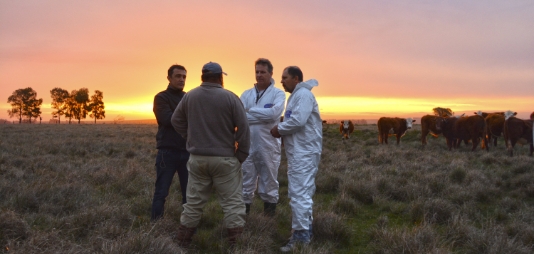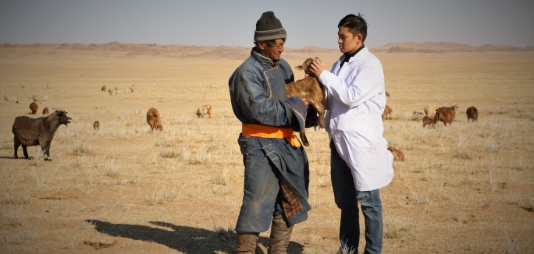ARTICLE
COVID-19:
Stepping up
global health management
In 2020, the World Organisation for Animal Health (OIE) joined the global effort to respond to COVID-19. To prevent history from repeating itself, a commitment to the One Health approach with a reinforced role of Veterinary Services to step up global health management is essential.
Global health: Never let a crisis go to waste
“Never let a crisis go to waste” is a common saying in crisis management circles. The COVID-19 pandemic must be leveraged as a wake-up call for strengthening global cooperation on health challenges at the human-animal-environment interface. Now is the time to make the One Health approach a reality by creating a coherent global health governance architecture and reinforcing Veterinary Services so that they can effectively contribute to addressing such challenges.
Health management: global collaboration for global health challenges
MERS-CoV, Ebola, avian influenza, and most probably COVID-19. These diseases of animal origin have shown that the capacity of countries to prevent, detect, and respond to outbreaks is neither comprehensive nor uniform. For this reason, global health security can only be achieved through the sharing of expertise across different sectors and countries.
The OIE has been a longtime collaborator with the World Health Organization (WHO) and Food and Agriculture Organization (FAO) in advocating for an integrated, multilateral approach to global health. This Tripartite collaboration has proven effective at addressing global challenges around zoonotic diseases and must be broadened to prevent and manage future pandemics. That is why, the United Nations Environment Programme (UNEP) will join the Tripartite, bolstering the relationship between health and the environment.
Reinforcing Veterinary Services’ capacities
Stronger Veterinary Services are more essential than ever in contributing to health security across the world. Global strategies to fight diseases should be supported by robust structures and sufficient resources at national level to implement them. Through several programmes, the OIE guides Veterinary Services towards better resilience.
The PVS Pathway for the sustainable improvement of Veterinary Services is one of these programmes. A country-focused and expert-led assessment of the capacity of national Veterinary Services to meet OIE international Standards, it helps them identify strengths and areas for improvement, while recommending adapted solutions. In 2020, the OIE has initiated the development of new approaches and methodologies to support remote and blended formats of the PVS Pathway services. The OIE Platform for the training of Veterinary Services also supports this capacity-building process, providing e-learning opportunities to improve competencies at national level.
Furthermore, the OIE is leading a multidisciplinary initiative to improve the sustainability of laboratories. Laboratory services play a key role in supporting health systems by contributing to disease surveillance, detection, and control. Yet, they face challenges in meeting critical requirements and sustaining capacity over time. Through this project, the OIE and its partners will leverage data to better understand these challenges and encourage innovative solutions to ensure that labs are safe, secure and sustainable.
Funding for PVS activities: Australia, Bill & Melinda Gates Foundation, European Union, Germany, Global Affairs Canada, United Kingdom, United States of America and World Bank
Funding for Training Platform: Australia, Bill & Melinda Gates Foundation, European Union, France, Germany, Italy, New Zealand, Switzerland, United States of America, United Kingdom and World Bank
Funding for sustainable laboratories: Global Affairs Canada and United Kingdom
Focus on emergency preparedness
Planning for animal health emergencies underpins preparedness. In an international environment marked by uncertainty and instability, the OIE is working to strengthen countries’ ability to prepare for and adapt to adverse situations.
Recognising the importance of simulation exercises to improve emergency preparedness, an expert group on animal health emergencies was convened in 2019 to help OIE Members prepare, deliver and learn from this kind of exercises. As a result, the OIE Guidelines for Simulation Exercises were published in 2020 to assist Veterinary Services in undertaking fit-for-purpose exercises that are scalable to resources and needs. By involving the relevant sectors to tackle shared threats at the human-animal-environment interface, simulation exercises can facilitate the practical implementation of the One Health approach.
Progress is being made, but it is not enough, or fast enough, to ensure that Veterinary Services are ready to face major crises or new challenges. Rebuilding a post-COVID world is the chance to prioritise these issues on which the health of humans, animals and the environment depend. We must ensure sustainable investments in Veterinary Services to face the threats of the future. We must not let this crisis go to waste.

